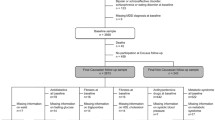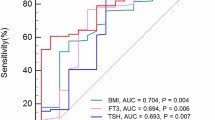Abstract
Previous studies pointed out the high prevalence of the metabolic syndrome among patients with bipolar disorder and major depression. A link between depression and a metabolic syndrome remains in dispute despite these studies. This study was conducted to evaluate the occurrence of the metabolic syndrome in depressive inpatients, to analyze the association between the severity of depression and the metabolic syndrome and to screen specific laboratory values in the course of depressive illness. 60 acute depressive patients were recruited for the study and underwent psychometric testing [21-item Hamilton Depression Rating Scale (HAMD), Beck Depression Inventory (BDI), Clinical Global Impression Scale (CGI) and Global Assessment of Functioning Scale (GAF)] and a metabolic syndrome screening using the modified criteria of the American National Cholesterol Education Program (NCEP) Treatment Panel III (ATP III). Moreover, CRP, cholesterol, HDL-cholesterol, fasting glucose, triglyceride and leptin levels were measured. 42 patients were reexamined in state of (partial) remission. Depression was reassessed using the 21-item HAMD, and laboratory values were analyzed a second time. 25% of the depressive patients fulfilled the criteria of metabolic syndrome (MS+). Only in the MS+ group, a positive correlation between triglyceride blood levels and severity of depression became evident as well in the state of acute depression as in the state of remission. In the group of patients without metabolic syndrome, laboratory values were not associated with severity of depression. An association between metabolic parameters and the course of depression could only be detected in the group of patients with metabolic syndrome. These findings suggest that, in these patients, a beneficial outcome of depressive illness may improve the metabolic situation.

Similar content being viewed by others
References
Al-Nozha M, Al-Khadra A, Arafah MR, Al-Maatouq MA, Khalil MZ, Khan NB, Al-Mazrou YY, Al-Marzouki K, Al-Harthi SS, Abdullah M, Al-Shahid MS, Al-Mobeireek A, Nouh MS (2005) Metabolic syndrome in Saudi Arabia. Saudi Med J 26:1918–1925
Eich D, Neuhaus C, Gamma A, Angst J, Rössler W, Ajdacic-Gross V, Opravil M (2007) Is depression a risk factor for heart complaints? Longitudinal aspects in the Zurich study. Eur Arch Psychiatry Clin Neurosci 257:396–401
Fagiolini A, Frank E, Scott JA, Turkin S, Kupfer DJ (2005) Metabolic syndrome in bipolar disorder: findings from the Bipolar Disorder Center for Pennsylvanians. Bipolar Disord 7:424–430
Ford ES, Giles WH, Dietz WH (2002) Prevalence of the metabolic syndrome among US adults: findings from the third National Health and Nutrition Examination Survey. JAMA 287:356–359
Glueck CJ, Tieger M, Kunkel R, Tracy T, Speirs J, Streicher P, Illig E (1993) Improvement in symptoms of depression and in an index of life stressors accompany treatment of severe hypertriglyceridemia. Biol Psychiatry 34:240–252
Grundy SM, Cleeman JI, Daniels SR, Donato KA, Eckel RH, Franklin BA, Gordon DJ, Krauss RM, Savage PJ, Smith SC Jr, Spertus JA, Costa F (2005) Diagnosis and management of the metabolic syndrome: an American Heart Association/National Heart, Lung, and Blood Institute Scientific Statement. Circulation 112:2735–2752
Guize L, Thomas F, Pannier B, Bean K, Danchin N, Bénétos A (2006) Metabolic syndrome: prevalence, risk factors and mortality in a French population of 62,000 subjects. Bull Acad Natl Med 190:685–700
Heiskanen TH, Niskanen LK, Hintikka JJ, Koivumaa-Honkanen HT, Honkalampi KM, Haatainen KM, Viinamäki HT (2006) Metabolic syndrome and depression: a cross-sectional analysis. J Clin Psychiatry 67:1422–1427
Herva A, Räsänen P, Miettunen J, Timonen M, Läksy K, Veijola J, Laitinen J, Ruokonen A, Joukamaa M (2006) Co-occurrence of metabolic syndrome with depression and anxiety in young adults: the Northern Finland 1966 Birth Cohort Study. Psychosom Med 68:213–216
Kinder LS, Carnethon MR, Palaniappan LP, King AC, Fortmann SP (2004) Depression and the metabolic syndrome in young adults: findings from the Third National Health and Nutrition Examination Survey. Psychosom Med 66:316–322
Kopf D, Deuschle M (2005) Lipid metabolism and insulin resistance in depressive patients. Psychoneuro 31:212–216
Koponen H, Jokelainen J, Keinänen-Kiukaanniemi S, Kumpusalo E, Vanhala M (2008) Metabolic syndrome predisposes to depressive symptoms: a population-based 7-year follow-up study. J Clin Psychiatry 69:178–182
Moebus S, Hanisch JU, Aidelsburger P, Bramlage P, Wasem J, Jöckel KH (2007) Impact of 4 different definitions used for the assessment of the prevalence of the Metabolic Syndrome in primary healthcare: The German Metabolic and Cardiovascular Risk Project (GEMCAS). Cardiovasc Diabetol 6:22
Neuhauser H, Ellert U (2005) Prävalenz des metabolischen Syndroms in Deutschland: eine Sensitivitätsanalyse. GMS German Medical Science Doc05gmds416. http://www.egms.de/en/meetings/gmds2005/05gmds183.shtml
Penttinen J (1995) Hypothesis: low serum cholesterol, suicide, and interleukin-2. Am J Epidemiol 141:716–718
Pjerk E, Winkler D, Abramson DW, Konstantinidis A, Stastny J, Willeit M, Praschk-Rieder N, Kasper S (2007) Serum lipid levels in seasonal affective disorder. Eur Arch Psychiatry Clin Neurosci 257:197–202
Sheikh N, Farhadi Nasab A, Araghchian M, Mani Kashani Kh (2004) The relationship of cholesterol and triglyceride with depression. Acta Med Iran 42:185–187
Teixeira PJ, Rocha FL (2007) The prevalence of metabolic syndrome among psychiatric inpatients in Brazil. Rev Bras Psiquiatr 29:330–336
Tuomilehto J (2005) Cardiovascular risk: prevention and treatment of the metabolic syndrome. Diabetes Res Clin Pract 68(Suppl 2):28–35
Vaccarino V, McClure C, Johnson BD, Sheps DS, Bittner V, Rutledge T, Shaw LJ, Sopko G, Olson MB, Krantz DS, Parashar S, Marroquin OC, Merz CN (2008) Depression, the metabolic syndrome and cardiovascular risk. Psychosom Med 70:40–48
Vogelzangs N, Suthers K, Ferrucci L, Simonsick EM, Ble A, Schrager M, Bandinelli S, Lauretani F, Giannelli SV, Penninx BW (2007) Hypercortisolemic depression is associated with the metabolic syndrome in late-life. Psychoneuroendocrinology 32:151–159
Author information
Authors and Affiliations
Corresponding author
Rights and permissions
About this article
Cite this article
Richter, N., Juckel, G. & Assion, HJ. Metabolic syndrome: a follow-up study of acute depressive inpatients. Eur Arch Psychiatry Clin Neurosci 260, 41–49 (2010). https://doi.org/10.1007/s00406-009-0013-5
Received:
Accepted:
Published:
Issue Date:
DOI: https://doi.org/10.1007/s00406-009-0013-5




